

Facebook’s Graph Search—Helpful or Harmful? By Katie O’Brien, Product Marketing Manager Earlier this year, Facebook unveiled their new Graph Search platform (still in beta format and limited release), which promises to “find more of what you’re looking for through your friends and connections.”
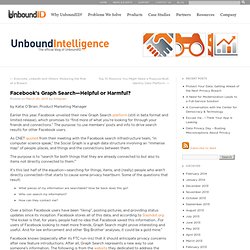
The purpose: to use members’ posts and info to drive search results for other Facebook users. As CNET quoted from their meeting with the Facebook search infrastructure team, “in computer science speak,” the Social Graph is a graph data structure involving an “immense map” of people, places, and things and the connections between them.
Facebook’s Graph Search: Be Careful What You “Like” Acclaimed US technology writer Steven Levy starts his long-form history of Facebook's newest product—Graph Search—by describing it as a feature that “promises to transform its user experience, threaten its competitors, and torment privacy activists.”
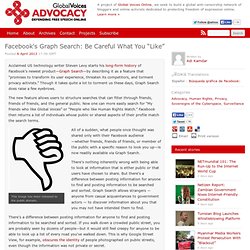
Though it takes quite a lot to torment us these days, Graph Search does raise a few eyebrows. The new feature allows users to structure searches that can filter through friends, friends of friends, and the general public. Now one can more easily search for “My friends who like Global Voices” or “People who like Human Rights Watch.” Facebook then returns a list of individuals whose public or shared aspects of their profile match the search terms. This image has been released to the public domain. Facebook's Graph Search Revolution. Facebook (FB) just became a one-stop shop.
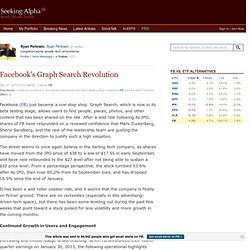
Graph Search, which is now in its beta testing stage, allows users to find people, places, photos, and other content that has been shared on the site. After a wild ride following its IPO, shares of FB have rebounded on a renewed confidence that Mark Zuckerberg, Sheryl Sandberg, and the rest of the leadership team are guiding the company in the direction to justify such a high valuation. The street seems to once again believe in the darling tech company, as shares have moved from the IPO price of $38 to a low of $17.55 in early September, and have now rebounded to the $27 level after not being able to sustain a $32 price level. From a percentage perspective, the stock tumbled 53.8% after its IPO, then rose 85.2% from its September lows, and has dropped 16.5% since the end of January. It has been a wild roller coaster ride, and it seems that the company is finally on firmer ground. Continued Growth in Users and Engagement.
How to graph. Privacy in Graph. Welcome to Forbes. Facebook & Semantic Web. Facebook Announces New Social Search Feature Called 'Graph Search' Well folks, it's the moment we've all been waiting for.
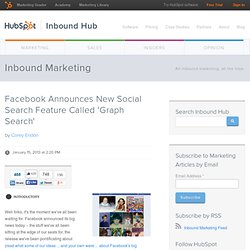
Facebook announced its big news today -- the stuff we've all been sitting at the edge of our seats for, the release we've been pontificating about (read what some of our ideas ... and your own were ... about Facebook's big reveal)! So ... what the heck is it? How Facebook’s Graph Search Just Replaced A Major Chunk Of Google. Facebook just took a big bite out of Google.
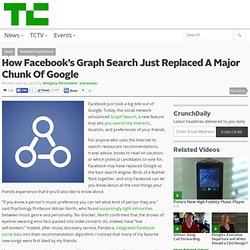
Today, the social network announced Graph Search, a new feature that lets you search the interests, location, and preferences of your friends. For anyone who uses the Internet to search restaurant recommendations, travel advice, books to read on vacation, or which political candidates to vote for, Facebook may have replaced Google as the best search engine. Birds of a feather flock together, and only Facebook can let you know about all the cool things your friends experience that’d you’d also like to know about.
“If you know a person’s music preference you can tell what kind of person they are,” said Psychology Professor Adrian North, who found surprisingly tight similarities between music genre and personality. No shocker, North confirmed that the droves of eyeliner-wearing emo fans packed into indie concerts do, indeed, have “low self-esteem.” Open Graph Protocol : Facebook se met au Web sémantique ? Retour le 21 avril au soir : Facebook organise l'événement F8 au cours duquel il va annoncer les évolutions de sa plate-forme à destination des développeurs.
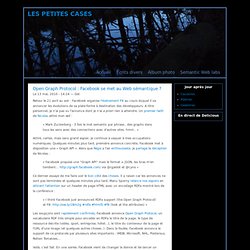
A titre personnel, je n'ai pas vu l'annonce dont je n'ai a priori rien à attendre. Un premier twitt de Nicolas attire mon œil : Will Facebook Profiles Gain Richer Open Graph Integration This Year? The Facebook user profile page has undergone significant changes over the past six years.
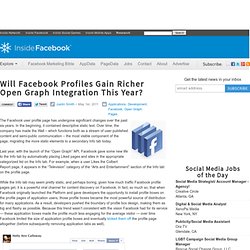
In the beginning, it contained descriptive static text. Over time, the company has made the Wall – which functions both as a stream of user-published content and semi-public communication – the most visible component of the page, migrating the more static elements to a secondary Info tab today. Last year, with the launch of the “Open Graph” API, Facebook gave some new life to the Info tab by automatically placing Liked pages and sites in the appropriate categorized list on the Info tab.
For example, when a user Likes the Colbert Report page, it appears in the “Television” category of the “Arts and Entertainment” section of the Info tab on the profile page. Facebook's Open Graph Is About Curating Your Life. In Facebook's f8 keynote today, CEO Mark Zuckerberg introduced two new classes of applications for the Facebook platform.
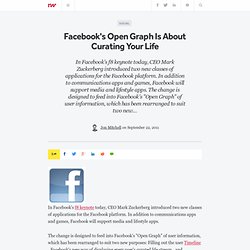
In addition to communications apps and games, Facebook will support media and lifestyle apps. Facebook Open Graph Seeks to Deliver Real-Time Serendipity. Facebook’s Open Graph Provides Marketers with New Opportunities. Facebook Announces New Social Search Feature Called 'Graph Search' Facebook To Twitter: Back Off, We Own People’s Interests. The battle over who owns your interests on the Web intensified today as Facebook started rolling out a set of new features designed to connect people more closely to the topics they care about.
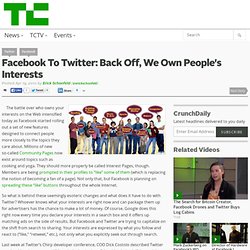
Millions of new so-called Community Pages now exist around topics such as cooking and yoga. They should more properly be called Interest Pages, though. Facebook Unveils the Secrets Behind the Like Button: Tech News and Analysis « If there’s one thing websites and publishers can’t get enough of, it’s analytics — data-mining tools like Google Analytics and real-time snapshots of activity like Chartbeat, which show who comes to a site and when, where they come from, and what they do when they get there.
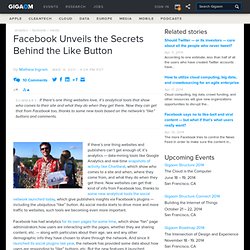
Now websites can get that kind of info from Facebook too, thanks to some new analytical tools the social network launched today, which give publishers insights via Facebook’s plugins — including the ubiquitous “like” button. As social media starts to drive more and more traffic to websites, such tools are becoming even more important. Facebook has had analytics for its own pages for some time, which show “fan” page administrators how users are interacting with the pages, whether they are sharing content, etc. — along with particulars about their age, sex and any other demographic info they have chosen to share through the network.
Like button analytics. Comment analytics. Demographic analytics. It’s time for a Facebook intervention. If you’ve followed my writing around TNW, you’re already aware that I’m not a fan of Facebook. I got challenged by Zee the other day to put into words the things that I don’t like about it and I finally had to stop and lay them all out. What I realized was that the Internet as a whole seems to be addicted to a single network, a single point of failure and it’s time for an intervention. First off, I have to say that there are absolutely positive sides to Facebook. We see stories every day of long-lost friends reunited, businesses that have been helped by having a personal touch and many other success stories.
Facebook on Collision Course With Google.